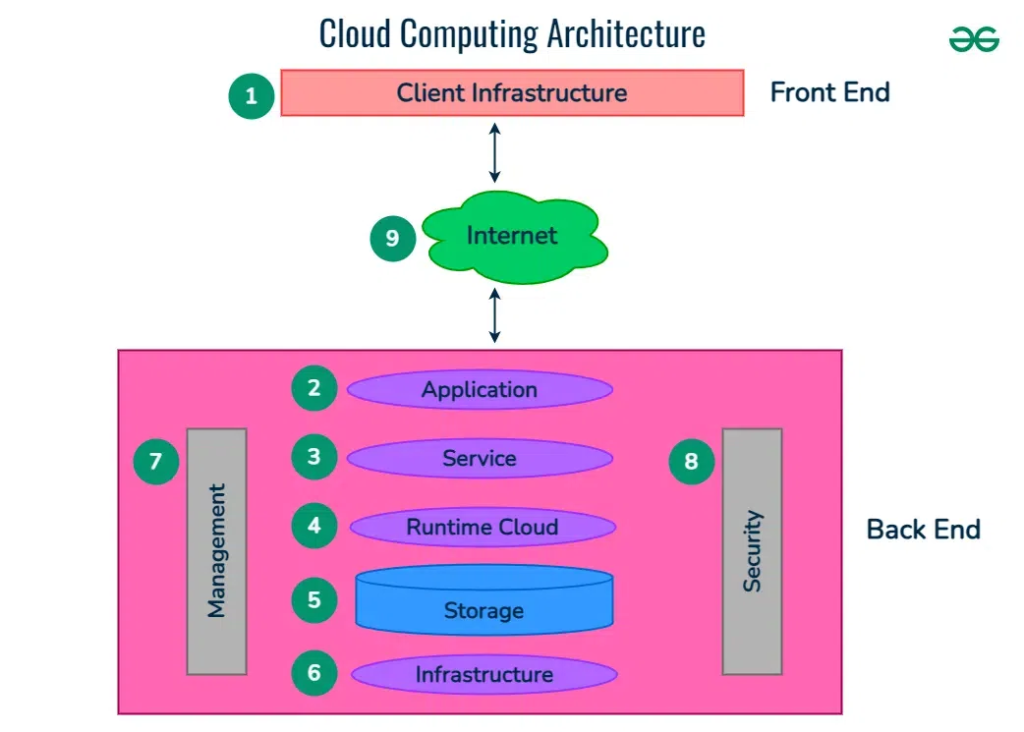In the dynamic and ever-evolving world of business, small businesses are constantly seeking ways to operate more efficiently and scale rapidly. One of the most powerful tools that businesses can leverage to enhance their efficiency, reduce costs, and scale operations is cloud computing. With its flexibility, scalability, and cost-effectiveness, cloud services have become an essential solution for small businesses aiming to compete with larger enterprises.
This article explores how small businesses can leverage cloud services to scale efficiently, focusing on the key benefits, types of cloud services, and practical strategies for adoption.
Key Takeaway
Small businesses can leverage cloud services to scale efficiently by reducing costs, automating routine tasks, enhancing collaboration, and accessing powerful technologies. Cloud services offer unmatched flexibility, security, and scalability, enabling small businesses to grow without the constraints of traditional IT infrastructure. By adopting cloud solutions, small businesses can drive productivity, optimize operations, and position themselves for long-term success.
What Are Cloud Services?

Before diving into the ways small businesses can leverage cloud services, it’s important to first understand what cloud services are. In simple terms, cloud services refer to a variety of services offered via the internet, including data storage, servers, databases, networking, software, and analytics, among others. These services are typically hosted by cloud service providers (CSPs) such as Amazon Web Services (AWS), Microsoft Azure, Google Cloud, and others.
Instead of maintaining physical infrastructure, small businesses can use cloud services to access these resources on demand, pay as they go, and scale their operations as needed.
Why Should Small Businesses Use Cloud Services?
| Reason | Description |
|---|---|
| Cost Efficiency | Cloud services eliminate the need for expensive hardware and reduce IT infrastructure costs. |
| Scalability | Small businesses can easily scale resources up or down based on demand, allowing for flexible growth. |
| Increased Collaboration | Cloud-based tools enable real-time collaboration, regardless of team location. |
| Data Security | Cloud providers invest in advanced security measures, ensuring data protection and reducing risks. |
| Automatic Software Updates | Cloud services are regularly updated, ensuring businesses have access to the latest features. |
| Access from Anywhere | Cloud services allow access to data and applications from any device with an internet connection. |
| Business Continuity | Cloud backups and disaster recovery solutions help businesses resume operations quickly after disruptions. |
| Improved Efficiency | Cloud services automate processes and simplify workflows, boosting productivity. |
| Access to Advanced Technologies | Cloud platforms provide access to cutting-edge technologies like AI, analytics, and machine learning. |
| Flexibility | Businesses can customize cloud solutions to meet specific needs, ensuring optimal performance. |
| Reduced IT Maintenance | Cloud services reduce the need for businesses to manage and maintain complex IT infrastructure. |
| Environmental Benefits | Cloud computing reduces the need for on-site servers, contributing to sustainability and lower energy consumption. |
| Faster Deployment | Cloud services enable businesses to implement solutions quickly without long installation times. |
For small businesses, adopting cloud services presents a myriad of advantages that directly contribute to growth and efficient scaling. Here are some key reasons why small businesses should consider moving to the cloud:
Cost Efficiency
Small businesses typically operate on tighter budgets, making it essential to find cost-effective solutions. Cloud services allow businesses to avoid the high upfront costs associated with purchasing and maintaining physical servers and infrastructure. Instead, they can pay only for the resources they use, lowering capital expenses and reducing the total cost of ownership.
Scalability
One of the main challenges small businesses face is scaling operations without compromising service quality or increasing costs. Cloud services enable businesses to scale up or down quickly in response to changing demands. Whether it’s handling a sudden spike in website traffic or expanding operations into new markets, cloud services provide the flexibility needed to grow without the limitations of traditional infrastructure.
Increased Collaboration and Productivity
Cloud-based tools allow employees to collaborate in real time, no matter where they are located. Whether it’s document sharing, video conferencing, or project management, cloud services foster collaboration and streamline workflows, improving overall productivity. This is especially important for small businesses that may have remote teams or work with freelancers.
Data Security and Backup
Security is a major concern for businesses of all sizes, but cloud service providers invest heavily in advanced security measures to ensure their platforms are safe from data breaches and cyberattacks. With regular backups and data redundancy features, cloud services also ensure that critical business data is protected and can be recovered if needed.
Access to Advanced Technologies
Cloud services provide access to powerful tools and technologies that might otherwise be out of reach for small businesses. These include artificial intelligence (AI), machine learning, analytics, and big data processing capabilities. By using cloud-based applications, small businesses can stay competitive by leveraging these advanced technologies.
Disaster Recovery
Cloud services also offer business continuity and disaster recovery solutions. In the event of a system failure, data loss, or natural disaster, cloud backups ensure that businesses can restore their operations with minimal downtime, reducing the risk of significant financial losses.
What Types of Cloud Services Can Small Businesses Use?

Small businesses can choose from a range of cloud service models, each designed to meet specific business needs. The main types of cloud services include:
Infrastructure as a Service (IaaS)
IaaS provides businesses with virtualized computing resources over the internet. This includes servers, storage, and networking capabilities. Small businesses can use IaaS to avoid the costs and complexities of managing physical servers, instead opting for scalable, on-demand resources that can be easily expanded or reduced based on their needs. Popular IaaS providers include AWS, Microsoft Azure, and Google Cloud.
Platform as a Service (PaaS)
PaaS delivers a platform that allows businesses to develop, run, and manage applications without dealing with the underlying infrastructure. This is ideal for small businesses that need to create custom software applications but do not have the resources to manage hardware or operating systems. Examples of PaaS providers include Google App Engine, Microsoft Azure App Service, and Heroku.
Software as a Service (SaaS)
SaaS provides ready-to-use software applications that can be accessed via the internet. These applications often include popular tools for email, customer relationship management (CRM), accounting, project management, and more. Small businesses can leverage SaaS to access the latest software without needing to worry about updates, patches, or infrastructure management. Examples include Google Workspace, Microsoft 365, and Salesforce.
Backup and Disaster Recovery Solutions
Cloud backup and disaster recovery services offer small businesses the ability to securely back up their data and ensure that critical business functions can be resumed in the event of a failure. Services like Acronis, Backblaze, and Veeam provide businesses with automated backup solutions and recovery options, ensuring that data can be restored swiftly.
Cloud Storage Services
Cloud storage services allow businesses to store data securely and access it from any device connected to the internet. Services like Dropbox, Google Drive, and OneDrive provide businesses with a reliable and scalable solution for file storage and sharing. With cloud storage, businesses can ensure that their documents, files, and other data are safe, secure, and accessible.
How Can Small Businesses Use Cloud Services to Scale?
Now that we’ve covered the types of cloud services available to small businesses, let’s take a look at some practical strategies for utilizing these services to scale efficiently.
Start with the Basics: Migrate to the Cloud
The first step for small businesses looking to scale is to migrate their essential services to the cloud. This could include moving email, file storage, or accounting software to cloud-based platforms. By taking advantage of SaaS solutions, businesses can start scaling their operations without a significant upfront investment in hardware or infrastructure.
Automate Routine Tasks
Cloud services can help automate repetitive tasks, freeing up time for employees to focus on higher-value work. For example, small businesses can automate marketing campaigns with cloud-based tools like Mailchimp, or streamline customer service with cloud-based helpdesk solutions like Zendesk. Automation not only boosts efficiency but also reduces the risk of errors.
Improve Data Analytics and Insights
With the vast amounts of data generated by modern businesses, cloud-based analytics tools can help small businesses make data-driven decisions. Cloud platforms like Google Analytics, Power BI, and Tableau offer businesses access to advanced data visualization and reporting tools, helping them identify trends, optimize marketing efforts, and make better-informed decisions.
Ensure Business Continuity
By using cloud-based disaster recovery and backup solutions, small businesses can ensure they are prepared for any unforeseen disruptions. This helps maintain continuity and reduces the risk of costly downtime.
Leverage Collaboration Tools
Small businesses can adopt cloud-based collaboration tools such as Slack, Trello, or Asana to streamline communication and project management across teams. This is particularly useful for businesses with remote or distributed teams, allowing them to work together seamlessly regardless of location.
Scale on Demand
As businesses grow, they can leverage the scalability of cloud services to meet increasing demands without investing in costly infrastructure. Whether it’s expanding storage capacity or increasing server resources, cloud services allow small businesses to scale up quickly and efficiently as their needs change.
Enhance Customer Experience
Cloud-based customer relationship management (CRM) systems like Salesforce or HubSpot can help small businesses improve customer service by providing a Centralisation platform for managing customer interactions. By offering personalized and timely service, businesses can build stronger relationships and enhance the customer experience.
Also Read :- How Can AI And Machine Learning Enhance Cloud Security?
Conclusion
Cloud services offer small businesses an incredible opportunity to streamline operations, scale efficiently, and stay competitive in an increasingly digital world. From cost savings and enhanced security to improved collaboration and scalability, cloud services can empower small businesses to meet their goals with ease. By adopting the right cloud tools and strategies, small businesses can unlock the potential to grow rapidly, deliver exceptional customer experiences, and maintain operational efficiency.
FAQs
What is cloud computing, and how does it benefit small businesses?
Cloud computing refers to the delivery of computing services like servers, storage, and software over the internet. For small businesses, it offers cost savings, flexibility, scalability, and increased collaboration.
What types of cloud services are best for small businesses?
The best cloud services for small businesses depend on their specific needs. SaaS tools are ideal for off-the-shelf applications, IaaS for scalable infrastructure, and PaaS for app development.
How can cloud computing help small businesses scale quickly?
Cloud computing allows small businesses to scale resources on demand without the need for significant capital investment in physical infrastructure. It offers flexibility, automated processes, and enhanced collaboration tools, enabling rapid growth.
Is cloud computing secure for small businesses?
Yes, cloud providers invest in robust security measures, such as encryption, multi-factor authentication, and regular backups. However, small businesses must also implement their own security practices to protect data.
What are some popular cloud service providers for small businesses?
Popular cloud service providers for small businesses include Amazon Web Services (AWS), Microsoft Azure, Google Cloud, Dropbox, and Salesforce.
How can small businesses use cloud services for disaster recovery?
Cloud-based disaster recovery services automatically back up critical data, ensuring that businesses can restore operations in the event of an outage or disaster. These services typically offer quick recovery times and offsite backups.
Can cloud services reduce IT costs for small businesses?
Yes, cloud services eliminate the need for businesses to maintain expensive physical servers and IT infrastructure, resulting in reduced IT costs. Businesses only pay for what they use, further optimizing cost efficiency.

